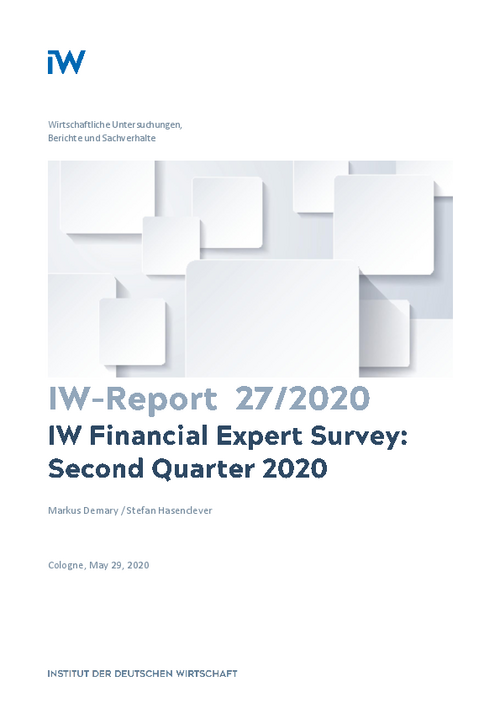Pessimism related to the outbreak of the Coronavirus Disease 2019 and its development in 2020 determines the experts’ predictions for the second and third quarter of 2020. The pessimistic outlook can be inferred from the downward revisions of the experts’ forecasts.

IW Financial Expert Survey: Second Quarter 2020
IW Report

Pessimism related to the outbreak of the Coronavirus Disease 2019 and its development in 2020 determines the experts’ predictions for the second and third quarter of 2020. The pessimistic outlook can be inferred from the downward revisions of the experts’ forecasts.
More downward revisions than upward revisions for almost all indicators illustrate that the survey participants assume that the corona crisis will plunge the economy into recession over the next two quarters. Consequently, all experts have revised their growth outlooks for Germany and the Euro Area downwards. The same applies for the prediction of Germany’s and the Eurozone’s inflation rates with one exception. At a first glance, it may seem counterintuitive that the subdued inflation and growth outlooks associated with the corona crisis are not reflected in the experts’ short-term interest rates forecasts as most experts revised these upwards. Obviously, this is related to the previous pessimistic projections of the short-term rate after it has plunged in September 2019 as a reaction to the ECB’s cut of the deposit rate to -0.5 percent. Though, most of the experts expect the short-term to rise but the projected rates are still lower than the current rate at the end of March 2020. These projections cover the forecasters expected path of monetary policy. Following the corona crisis, the FED has cut the FED Funds Rate aggressively so that both the FED Funds rate and the EZB main policy rate have been at their effective lower bound at the end of March. Most experts predict that neither the ECB nor the FED will adjust their short-term policy rate during the second quarter of 2020. Hence, the main policy instrument of these central banks is expected to remain accommodative.
The participants still expect the yield curve to become flatter. The lower average forecasts for the short-term interest rate are consistent with the experts’ lower inflation and growth expectations. For 2020, the experts expect 0.7 percent inflation in the Eurozone and a growth rate of real gross domestic product of -4.9 percent, which indicates a plunge of economic growth and a failure of the European Central Bank (ECB) to meet its inflation target. Given that, the forecasters have lowered their outlook for the long-term interest rate to -0.57 percent at the end of the second quarter of 2020. The yield on US Treasury bonds with 10-years maturity is expected to increase slightly from 0.67 percent at the end of March 2020 to 0.76 percent by the end of the second quarter 2020. In the light of the global flight to safety in government debt due to the outbreak of the corona crisis, the US long-term rate has hit a new low in March 2020. The Federal Funds Rate is anticipated to remain at 0.00-0.25 percent, i.e. its effective lower bound. The increase in demand for safety assets together with the investors’ needs to raise cash for debt repayments denominated in USD have been leading to an appreciation of the USD in the first quarter 2020. Until the end of the second quarter, the participants predict a small depreciation of the US-Dollar against the Euro from 1.103 Euros at the end of the first quarter 2020 to 1.096 Euros at the end of the second quarter 2020.
Due to the expected fall in output and the heighted uncertainty associated with the corona crisis, for all three stock market indices the experts have revised their three-month ahead forecasts downwards. By the end of the second quarter 2020 they expect the DAX, the Stoxx 50 and the S&P 500 to decrease by -6.3 percent, -6.2 percent, and -0.5 percent, respectively. However, for the end of the third quarter 2020 a recovery on the stock markets is expected with the S&P 500 index is predicted to recover best. In the long-term ranking, which covers the last 18 quarters, National-Bank defended rank one, while Nord/LB and Commerzbank remained at rank two and three, respectively.

Markus Demary / Stefan Hasenclever: IW Financial Expert Survey – Second Quarter 2020
IW Report

More on the topic

The Energy Dependence of Bank Loans
Russia's war against Ukraine has highlighted the vulnerability of the Federal Republic of Germany to Russian energy imports, especially natural gas.
IW
This time is different but still risky: Banking crisis instead of financial crisis
The current crisis of some American and European banks inevitably triggers fears that an international banking crisis could lead to a new financial crisis. But things in 2023 are very different from those in 2007.
IW